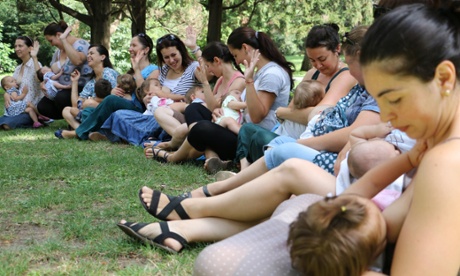
There’s been a lot of discussion recently around breastfeeding. In particular, whether paying women to breastfeed could give babies a better start in life. A thought provoking Comment Is Free piece discussed the elephant in the room – social class – and questioned whether findings from observational studies really can tell us that breastfeeding protects a baby from these harmful outcomes, or whether it’s due to social class. It reminded me of a great study that was conducted by some of my colleagues to investigate this.
Likelihood to breastfeed is highly socially patterned in the UK – those with a higher income are more likely to breastfeed, and for longer (in general). But that isn’t true all over the world. Marie-Jo Brion and her colleagues realised that they could compare observational associations seen the UK with those from somewhere where there wasn’t this social patterning, to try and work out whether breastfeeding was really protective.
They, like me, work with the Children of the 90s dataset based in Bristol, that recruited thousands of pregnant women around Bristol in the early 1990s. They contacted researchers in Pelotas, Brazil, where there was a similar but slightly smaller cohort of pregnant women. While breastfeeding was strongly socially patterned in Children of the 90s, there was no association between breastfeeding and income in the Brazilian cohort (breastfeeding was more common in the Brazilian cohort, and was likely to be for a longer duration in Brazil as well).
The theory was: if breastfeeding is associated with various health outcomes in both cohorts, this is much stronger evidence for it causing them. If the associations are only seen in the UK cohort, it’s more likely that these are due to other differences between people with higher or lower incomes.
Brion and her colleagues looked at associations between breastfeeding and IQ, obesity and blood pressure, in both cohorts. They found that breastfeeding was associated with all of these in Children of the 90s: IQ was higher in children that were breastfed, and blood pressure and levels of obesity were lower, as has been found before.
However, this wasn’t the case in Pelotas. An association was still seen between breastfeeding and childhood IQ. However, there was no evidence of an association between breastfeeding and obesity or blood pressure. This points to the possibility that at least some of the associations between breastfeeding and health outcomes are likely to be due to other differences between women who breastfeed and those who don’t.
Their study also provides some evidence that breastfeeding could be causing the difference in IQ seen in both cohorts. However, Brion and colleagues point out that although this relationship remained after accounting for a number of other differences that are likely to exist between women who breastfeed and those who don’t (in either cohort), the size of the associations get a lot smaller once these differences are accounted for. This is known as attenuation, and when a large amount of attenuation is seen like this, it might indicate that there is still some unmeasured difference which could be driving the association seen.
Of course, the difference in social patterning of breast feeding isn’t the only difference between the Brazilian and Bristol cohorts. As Eliane Glaser’s article pointed out, randomised controlled trials of breastfeeding would be the best way to ascertain what associations really are causal. Observational epidemiology is notoriously difficult to do well, but I find studies like this that try and think of ways to overcome the limitations really exciting.

